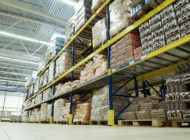Sensitive materials require a sensitive supply chain. For makers of foods, pharmaceuticals and other temperature-sensitive products, such a supply chain is one that can protect the temperature requirements of products from production all the way to final delivery. The temperature-controlled warehouse is a key component of making sure this happens. In this article, we’ll provide 10 questions to ask a warehousing provider to make sure that it has what it takes to keep your products in range.
10 questions when selecting a temperature-controlled warehouse
- Can you store multiple temperature ranges? Whether your products require ambient, refrigerated or frozen space, there are third-party logistics (3PL) warehousing providers that can cater to your specific temperature range requirements. There are also 3PLs that can handle all your temperature ranges within the same facility. This is achieved through physical segregation measures at the facility as well as technology (e.g., warehouse management system – WMS) support and maintain that segregation. By partnering with a 3PL that can handle all your ranges, you can eliminate time and costs associated with outsourcing to multiple providers.
 What temperature monitoring systems do you have in place? While it’s vital that your products are stored in accordance with their temperature requirements, it’s even more important that those temperatures stay in range 100% of the time. To accomplish this, your 3PL will have a robust internal monitoring system to track temperatures 24/7/365. At Kanban Logistics, we also have an external monitoring service that monitors our temperatures in conjunction with our own.
What temperature monitoring systems do you have in place? While it’s vital that your products are stored in accordance with their temperature requirements, it’s even more important that those temperatures stay in range 100% of the time. To accomplish this, your 3PL will have a robust internal monitoring system to track temperatures 24/7/365. At Kanban Logistics, we also have an external monitoring service that monitors our temperatures in conjunction with our own.- What happens if temperatures go out of range? In the event that monitoring shows an area to be out of range, you’ll need to know that your 3PL is on the case immediately – even if it’s outside of business hours.
- Do you control and monitor humidity in addition to temperature? When it comes to the integrity of food and pharmaceutical products, humidity can be every bit as important as temperature. If it’s important to your products, you will want to partner with a provider that offers “climate-controlled warehousing” (which encompasses temperature and humidity control) and not just temperature-controlled warehousing.
- How do you prevent cross contamination of products? Temperature-sensitive products such as foods and pharmaceuticals are often very sensitive to exposure from other products. For instance, if you have a pallet of one food item in an area that previously held a nut product, you run the risk of contaminating your entire pallet with an allergen. As such, you’ll need to understand the measures that your 3PL will take to prevent cross contact within in the warehouse.
- How do you ensure compliance with the FSMA, GMP and other regulations? Whether it’s requirements related to the Food Safety and Modernization Act (FSMA), Good Manufacturing Practices (GMP) or your own company requirements, you need to make sure that your 3PL provider’s practices will be in full compliance. To do this, you can ask for results of internal audits as well as audits and certifications from agencies like AIB International. Some 3PL companies, like Kanban Logistics, are even ISO-9001-certified and adhere to a quality management program that’s as thorough as it gets.
- Can we audit your facility/operation? As impressive as your prospective 3PL’s audit history may be, you still may want your own internal team to conduct a thorough audit of the 3PL’s operation to make sure that it can comply with your own internal standards. A good 3PL will welcome such an audit and accommodate you every step of the way.
- Do you offer temperature-controlled transportation services? In addition to temperature-controlled warehousing, many 3PLs can handle additional components of your supply chain while keeping your products’ temperatures in range. A common example of this is refrigerated transportation.
- Can you handle import containers? If you have products or raw materials coming to the U.S. aboard containers, your 3PL may be able to provide portside services for you. These include drayage, transloading, container loading, and JIT delivery to manufacturers. Food logistics companies like Kanban that are registered with the FDA can even facilitate inspection of your products by FDA personnel at its warehouses. We can also provide samples of your products to your quality control team.
- When can we visit? As important as the questions above are, a good old-fashioned site visit will often tell you much of what you need to know about a 3PL’s ability to effectively warehouse your products. In addition to seeing some of what’s already been discussed in action, a site visit is a good opportunity to assess a facility’s basic – yet vital – food warehousing characteristics like sanitation, structural integrity, security, ease of access, associate demeanor, and pest control. Be sure to visit your prospective provider at least once before proceeding with a partnership.
Trust your temperature-sensitive products to Kanban Logistics
Located in Eastern North Carolina, Kanban Logistics operates within strict FSMA and GMP regulations in addition to the individual requirements of our many food and pharmaceutical customers. We take pride in our ISO:9001:2015 certification as well as our superior rating from AIB International – just two prominent examples of our leave-no-stone-unturned approach to quality and product integrity. To learn how Kanban can protect the integrity of your products in our temperature-controlled warehouses, contact us today.


